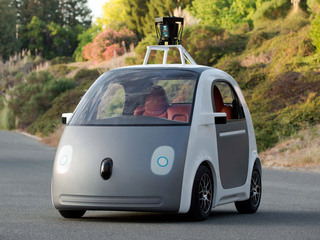The FDA outlines draft guidance on AI for medical devices
The agency also published draft guidance on the use of AI in drug development
Read more...
Google has been at the forefront of the self driving car movement for years. It's something that we have been hearing about for a long time, and now the company is making some moves that indicate that they could be here pretty soon.
The company is planning to make its self-driving cars unit a stand alone company, under the umbrella of Alphabet, according to a report out from Bloomberg on Wednesday. The restructuring is supposed to take place sometime next year.
Since the cars have already been tested in San Francisco and Austin, logging over a millon miles, the company will likely launch services in those cities, allowing users to pay for rides. Specifically, the plan is to first make them available in places like college campuses, military bases or corporate office parks.
VatorNews reached out to Google for confirmation of this plan, but a company spokesperson would not comment on the report.
Spinning driverless cars off into its own division is an interesting move, but not an unprecidented one. Since Google restructured as Alphabet earlier this year, it has been taking some of its divisions and making them stand alone companies, most notably Google X, the life sciences division that is responsible for all of Google so-called "moonshot projects," a.k.a. all the really cool stuff they do.
Google X projects included Google Glass, as well as Project Loon, which was Google's idea of giving everyone around the world access to the Internet by using solar powered balloons, as well as a smart contact lens for monitoring diabetes, along with something called Baseline Study, which will involve the collecting of genetic and molecular information from a group of people. It also includes Lift Labs, the creators of an electronic device that improves the quality of life for those with Parkinson’s and essential tremor, which the company bought in 2013.
Its other major project was, of course, the driverless car.
This move by Google also shows how seriously the company is taking the project, and how important it is to the company's future.
Google began testing driverless cars back in 2011 in Nevada and the cars are already legal in various states. The company is well on its way toward commercialization. The vision proposed would be of self-driving cars roaming our city streets as Yellow cars are. You wouldn't even need to book them in advance, as a hand gesture would suffice.
In September, Google hired TrueCar president John Krafcik as CEO of its self-driving car project, as part of the company's restructuring as Alphabet.
When Google starts to offering rides to people, that will put it into direct competition with e-hailing apps, like Uber and Lyft.
Uber, however, is not about to be left behind. The company announced earlier this year that it is working on its own self-driving vehicles at the Advanced Technologies Center located Pittsburgh, Pa, near the Carnegie Mellon University (CMU) campus. The facility is the offspring of a strategic partnership between Uber and CMU.
It is Apple, though, that might get there first, before either Google or Uber. The company recently stated that it planned to have its first car done by 2019. Though it would not be a driverless car, it would obviously be a big step toward bringing such a vehicle onto the road.
(Image source: wired.com)
The agency also published draft guidance on the use of AI in drug development
Read more...The biggest focus areas for AI investing are healthcare and biotech
Read more...It will complete and submit forms, and integrate with state benefit systems
Read more...

